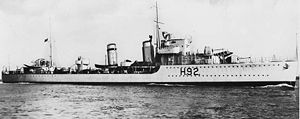HMS Glowworm: Difference between revisions
imported>Howard C. Berkowitz (New article generated using Special:MetadataForm) |
Pat Palmer (talk | contribs) m (Text replacement - "cruiser|heavy cruiser" to "heavy cruiser") |
||
| (4 intermediate revisions by 2 users not shown) | |||
| Line 1: | Line 1: | ||
{{subpages}} | {{PropDel}}<br><br>{{subpages}} | ||
[[Image:HMS Glowworm.jpg|left|thumb|300px|''HMS Glowworm'' in early days]] | |||
In scouting the situation in Norway, the [[G-class (U.K. destroyer)|G-class]] fleet [[destroyer]] '''''HMS Glowworm''''', on April 8, 1940, came out of a rain squall and confronted a German [[[[cruiser|heavy cruiser]]]], ''Admiral von Hipper''. Glowworm tried to hit with guns and torpedoes, but did little damage while suffering much. Glowworm's captain, LCDR [[Gerard Roope]], ordered his sinking ship to ram, doing heavy damage to Hipper. | |||
Hipper, badly damaged, made a valiant effort to rescue survivors, but many, exhausted in the frigid waters, were lost, including LCDR Roope. CAPT Helmuth Heye of the ''Hipper'' sent the British, through International Red Cross recommending Roope for the Victoria Cross. When the story was confirmed by the repatriated surviving British officer on 10th July 1945, the VC was posted on 6th July 1945. <ref>{{citation | |||
| http://www.historyofwar.org/scripts/fluffy/fcp.pl?words=Glowworm&submit=Site+Search&d=/weapons_HMSGlowworm.html | |||
| title = HMS Glowworm | |||
| publisher = History of War. Org}}</ref> | |||
<blockquote>On the 8th April, 1940, H.M.S. Glowworm was proceeding alone in heavy weather towards a rendezvous in West Fjord, when she met and engaged two enemy destroyers, scoring at least one hit on them. The enemy broke off the action and headed North. The Commanding Officer at once gave chase. The German heavy cruiser, Admiral Hipper, was sighted closing the Glowworm at high speed. Because of the heavy sea, the Glowworm could not shadow the enemy and the Commanding Officer therefore decided to attack with torpedoes and then to close in order to inflict as much damage as possible. Five torpedoes were fired and later the remaining five, but without success. The Glowworm was badly hit; one gun was out of action and her speed was much reduced, but with the other three guns still firing she closed and rammed the Admiral’ Hipper. As the Glowworm drew away, she opened fire again and scored one hit at a range of 400 yards. The Glowworm, badly stove in forward and riddled with enemy fire, heeled over to starboard, and the Commanding Officer gave the order to abandon her. Shortly afterwards she capsized and sank. The Admiral Hipper hove to for at least an hour picking up survivors but the loss of life was heavy, only 31 out of the Glowworm’s complement of 149 being saved. The VICTORIA CROSS is bestowed in recognition of the great valour of the Commanding Officer who, after fighting off a superior force of destroyers, sought out and reported a powerful enemy unit, and then fought his ship to the end against overwhelming odds, finally ramming the enemy with supreme coolness and skill.</blockquote> | |||
==References== | |||
{{reflist}} | |||
Latest revision as of 11:58, 1 October 2024
| This article may be deleted soon. | ||
|---|---|---|
In scouting the situation in Norway, the G-class fleet destroyer HMS Glowworm, on April 8, 1940, came out of a rain squall and confronted a German [[heavy cruiser]], Admiral von Hipper. Glowworm tried to hit with guns and torpedoes, but did little damage while suffering much. Glowworm's captain, LCDR Gerard Roope, ordered his sinking ship to ram, doing heavy damage to Hipper. Hipper, badly damaged, made a valiant effort to rescue survivors, but many, exhausted in the frigid waters, were lost, including LCDR Roope. CAPT Helmuth Heye of the Hipper sent the British, through International Red Cross recommending Roope for the Victoria Cross. When the story was confirmed by the repatriated surviving British officer on 10th July 1945, the VC was posted on 6th July 1945. [1]
References
|
||
